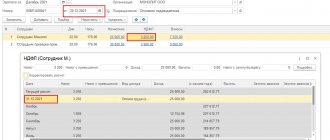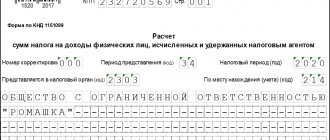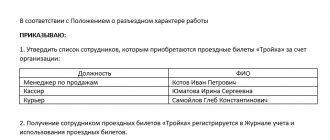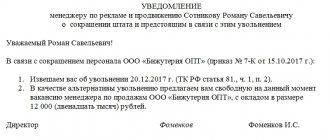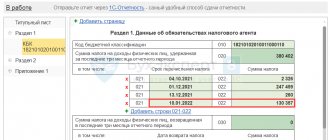Conditions for the benefit
Amounts paid by employers for the provision of medical services to their employees are not subject to personal income tax if they are transferred from funds remaining with the organization after paying income tax.
The source of payment is the first condition for exempting such income from personal income tax. In addition, to be exempt from personal income tax, it is necessary to comply with the conditions for paying expenses.
Let's return to the norm of the Tax Code of the Russian Federation. Although it may not be obvious, the deciding factor for the exemption is that the medical services must be paid for by the employer. The medical institution must receive company funds allocated specifically for medical services. The financiers also spoke about this in the letter dated December 3, 2018 No. 03-04-05/87037, which is referenced in the commented letter.
NTVP "Kedr - Consultant"
LLC "NTVP "Kedr - Consultant" » Services » Consultations on accounting and taxation » Personal income tax » Taxation of employer expenses under contracts for the provision of medical services with a medical institution and the income of an employee who received a medical service
In accordance with paragraph 9, paragraph 16, Article 255 of the Tax Code of the Russian Federation, direct expenses of the employer under contracts for the provision of medical services with a medical institution reduce the tax base for income tax in an amount not exceeding 6% of labor costs. For example: payment by an employer for an expensive operation of an employee is directly taken into account as expenses that reduce the tax base for income tax.
Questions
In this case, does the employee for whom he paid for medical insurance arise? employer services, need to pay personal income tax?
Is payment by an employer for medical services under a direct contract with a medical organization for an employee subject to insurance premiums?
Expert's answer
Personal income tax
In accordance with paragraph 10 of Article 217 of the Code, amounts paid by employers for the provision of medical services to their employees, their spouses, parents, children (including adopted children), wards under the age of 18, as well as former to their employees who resigned due to retirement due to disability or old age, and remaining at the disposal of employers after paying corporate income tax.
Thus, amounts paid by the employer for the cost of medical services provided to employees are exempt from personal income tax on the basis of paragraph 10 of Article 217 of the Code, subject to the conditions established by this norm.
At the same time, the possibility of exemption from personal income tax for amounts paid by the employer for the cost of medical services provided to employees is associated not with a decrease in the tax base for corporate income tax, but with the availability of funds to the organization after paying income tax, from which it is made, in in particular, payment of the cost of medical services.
If an employer pays for medical services to its employees at the expense of other means, the amounts of said payment are not subject to paragraph 10 of Article 217 of the Code and are subject to personal income tax in the prescribed manner.
{Question: About personal income tax and income tax when employers pay for medical services to their employees. (Letter of the Ministry of Finance of Russia dated August 21, 2018 N 03-04-06/59126) {ConsultantPlus}}
Amounts paid by employers for the provision of medical services to their employees are not subject to personal income tax if they are transferred from funds remaining with the organization after paying income tax.
The source of payment is the first condition for exempting such income from personal income tax. In addition, to be exempt from personal income tax, it is necessary to comply with the conditions for paying expenses.
Let's return to the norm of the Tax Code of the Russian Federation. Although it may not be obvious, the deciding factor for the exemption is that the medical services must be paid for by the employer. The medical institution must receive company funds allocated specifically for medical services. Financiers also spoke about this in Letter dated December 3, 2018 N 03-04-05/87037, which is referenced in the commented Letter.
Article: Commentary to the Letter of the Ministry of Finance of Russia dated January 24, 2019 N 03-04-05/3804 <When payment for an employee’s treatment is exempt from personal income tax> (Lvovsky S.M.) (“Regulatory acts for accountants”, 2022, N 5) { Consultant Plus}
Insurance premiums
The list of amounts not subject to insurance premiums is established by Art. 422 of the Tax Code of the Russian Federation. Among other things, the following are indicated here (clause 5, clause 1):
— the amount of insurance payments (contributions) for compulsory insurance of employees carried out by the payer in the manner established by the legislation of the Russian Federation;
- amounts of payments (contributions) of the payer:
under contracts of voluntary personal insurance of employees, concluded for a period of at least a year, providing for payment by insurers of medical expenses of these insured persons;
under contracts for the provision of medical services to employees, concluded for a period of at least a year with medical organizations that have appropriate licenses to carry out medical activities, issued in accordance with the legislation of the Russian Federation;
under contracts of voluntary personal insurance of employees, concluded exclusively in the event of death of the insured person and (or) harm to the health of the insured person;
— the amount of pension contributions of the payer under non-state pension agreements.
In accordance with this rule, if an organization pays for medical services (for example, optional medical examinations of employees) under VHI contracts or contracts for the provision of medical services, insurance premiums do not need to be charged. The Russian Ministry of Finance also focuses on this (see, for example, Letter dated June 21, 2019 N 03-15-06/45499), outlining the conditions that must be met to apply the benefit:
— contracts are concluded for a period of at least one year;
— the medical organization with which the contract is concluded has a license to carry out medical activities.
If the contract term is less than a year, it turns out that the above conditions are not met and the organization needs to pay insurance premiums (see Ruling of the RF Armed Forces dated January 26, 2016 No. 308-KG15-18034 in case No. A63-12268/2014).
Article: Contract for the provision of medical services: when can insurance premiums be waived? (Zaitseva S.N.) (“Pharmacy: accounting and taxation”, 2022, N 1) {ConsultantPlus}
How to take into account the costs of voluntary health insurance
Payments for voluntary health insurance are not subject to personal income tax and insurance premiums (clause 3 of article 213, clause 5 of clause 1 of article 422 of the Tax Code of the Russian Federation).
In tax and accounting, spread payments monthly over the period to which they relate. Accounting programs calculate the monthly part of expenses automatically (clause 6 of Article 272 of the Tax Code of the Russian Federation).
For income tax purposes, VHI expenses are normalized. Together with the cost of travel for employees, they should not exceed 6% of labor costs. When calculating the standard, take labor costs without payments for voluntary health insurance and other expenses for voluntary insurance of employees (clause 16 of article 255 of the Tax Code of the Russian Federation).
{Typical situation: How to take into account the costs of voluntary health insurance (Glavnaya Kniga Publishing House, 2020) {ConsultantPlus}}
As we can see from the above, regarding personal income tax, the main condition is that the payment be made directly to the medical organization and these expenses are incurred at the expense of net profit.
Regarding insurance premiums, it is necessary to conclude an agreement with a medical organization for a period of at least one year.
The explanation was given by the accountant-consultant of LLC NTVP "Kedr-Consultant" Natalya Borisovna Petrova in July 2022.
When preparing the answer, SPS ConsultantPlus was used.
This clarification is not official and does not entail legal consequences; it is provided in accordance with the Regulations of the CONSULTATION LINE ().
This consultation has passed quality control:
Reviewer: Selezneva Irina Akhmatyasavievna, Associate Professor of the Department of Accounting, Finance and Auditing, Izhevsk State Agricultural Academy
Compensation is a violation
The Tax Code of the Russian Federation does not provide for such a form of payment for medical services as compensation to an employee for expenses incurred for medical purposes. That is, the company must either transfer money to the medical institution in a non-cash manner, or give it to the employee from the cash register or transfer it to a card. And the employee must pay the medical institution with the money received. If this procedure is followed, there is no need to pay personal income tax. That is, if the listed conditions are met, amounts of payment for medical services for employees are exempt from personal income tax. Otherwise, such income is subject to personal income tax in accordance with the general procedure.
Taxes and Law
There are many cases when the treatment of employees is the responsibility of the employer, but sometimes the employer provides additional benefits to employees in the form of purchasing medications or paying for expensive treatment. At the same time, problems arise in distinguishing between types of treatment, as well as taxation of costs.
In accordance with the requirements of Art. Art. 209 and 219 of the Labor Code of the Russian Federation, as well as Art. 9 of the Federal Law “On the Fundamentals of Occupational Safety and Health in the Russian Federation”, the implementation of sanitary, sanitary and hygienic, treatment and preventive and other measures related to ensuring safe conditions and labor protection for workers is the responsibility of the employer. According to Art. 213 of the Labor Code of the Russian Federation, workers engaged in heavy work and in work with harmful and (or) dangerous working conditions (including underground work), as well as in work related to traffic, undergo mandatory medical examinations (examinations) in order to determine the suitability of these workers to perform the assigned work and prevent occupational diseases, both preliminary (upon entry to work) and periodic (for persons under the age of 21 - annually). Orders of the Ministry of Health of the USSR dated September 29, 1989 N 555, and the Ministry of Health and Medical Industry of the Russian Federation dated March 14, 1996 N 90 are devoted to the procedure for conducting mandatory preliminary as well as periodic medical examinations of road transport workers.
In addition, in accordance with medical recommendations, such employees undergo extraordinary medical examinations (examinations). Based on Article 348.3 of the Labor Code of the Russian Federation, athletes are also subject to mandatory preliminary medical examination (examination).
Article 323 of the Labor Code of the Russian Federation provides guarantees of medical care for persons working in organizations financed from the federal budget located in the regions of the Far North and equivalent areas. Thus, a collective agreement may provide for payment at the expense of the organization’s funds for the cost of travel within the territory of the Russian Federation for medical consultations or treatment in the presence of an appropriate medical certificate issued in the manner established by federal laws and other regulatory legal acts of the Russian Federation, if the relevant consultations or treatment is not can be provided at your place of residence.
Also, employees of some executive, judicial and legislative authorities have the right to medical care. Thus, in accordance with Article 45 of the Federal Law of July 21, 1997 N 114-FZ “On Service in the Customs Authorities of the Russian Federation,” customs officials have the right to free medical care in healthcare institutions of the customs authorities system. Similar guarantees are provided for judges on the basis of the Federal Constitutional Law on Arbitration Courts in the Russian Federation of April 28, 1995 No. 1-FKZ.
By virtue of Art. 1085 of the Civil Code of the Russian Federation, the employer is also obliged to compensate the employee for additional expenses incurred due to damage to health, including treatment, purchase of medications, prosthetics, outside care, if it is established that the victim needs these types of help and care and does not have the right to receive them free of charge .
Payment for treatment, purchase of medicines
in case of work injuries
Paying for treatment and purchasing medications in case of work-related injuries is the responsibility of the employer. These compensations are calculated from the Social Insurance Fund, to which the employer makes contributions in accordance with the law.
However, the employer should pay attention to the following fact. Employees working on the basis of employment contracts are subject to compulsory insurance against industrial accidents. With regard to employees working on the basis of civil contracts, the situation is somewhat different. Such employees are subject to compulsory insurance against industrial accidents only if the employer’s obligation to insure the employee is established by a civil contract.
If the contract does not stipulate this obligation of the employer, he has no reason to pay insurance premiums to the insurer for such employees. And in this case, if an accident occurs at work, the harm caused to an employee working on the basis of a civil contract is compensated by the employer. Compensations from the Social Insurance Fund are not accrued or paid to such persons.
Thus, if the injury is of a work-related nature, the employer pays compensation. He is obliged to compensate the victim for his lost earnings under a civil contract and the moral damage caused (clause 3 of Article 8 of Law No. 125-FZ).
Compensation paid to compensate for harm caused to an employee is subject to clause 3 of Art. 217 of the Tax Code of the Russian Federation and is not subject to personal income tax.
Clause 2, Part 1, Art. 9 of Law N 212-FZ contains an exhaustive list of types of compensation payments that are not subject to insurance premiums for payers of insurance premiums making payments and other remuneration to individuals.
According to paragraphs. “a” clause 2, part 1, art. 9 of Law N 212-FZ are not subject to insurance premiums for payers of insurance premiums specified in clause 1, part 1, art. 5 of Law N 212-FZ, compensation payments (within the limits established in accordance with the legislation of the Russian Federation) related to compensation for harm caused by injury or other damage to health. The amounts of vacation payments for the period of sanatorium-resort treatment of employees injured as a result of an industrial accident are subject to paragraphs. “a” clause 2, part 1, art. 9 of Law No. 212-FZ.
At the same time, it is recommended that these costs be reflected in the collective agreement, in which it is advisable to indicate the amount of payment for treatment and the procedure for providing treatment to the employee.
Payment for treatment and purchase of medications for someone other than your employee
An organization can cause harm not only to its employees, but also to others.
The most common situation is a traffic accident due to the fault of an employee of the organization, which results in harm to the health of a third party.
In such a situation, by virtue of paragraph 1 of Art. 1068 of the Civil Code of the Russian Federation, a legal entity is obliged to compensate for damage caused by its employee in the performance of labor (official, official) duties.
In this case, the organization is obliged to compensate for the damage in full (clause 1 of Article 1064 of the Civil Code of the Russian Federation).
According to Art. 1085 of the Civil Code of the Russian Federation, when a citizen is injured or otherwise damaged his health, the victim’s lost earnings (income) that he had or definitely could have, as well as additional expenses incurred due to damage to health, are subject to compensation.
Since the obligation of the organization to compensate the harm to the victim is provided for by the Civil Code of the Russian Federation, the amount paid by the organization to an individual in compensation for harm caused to him by an employee of the organization in the performance of his labor (official, official) duties is a compensation payment, which, by virtue of clause 3 of Art. 217 of the Tax Code of the Russian Federation is not subject to personal income tax.
This position is also shared by the Russian Ministry of Finance (Letter dated March 26, 2008 N 03-04-06-01/65).
However, the Ministry of Finance previously held a different opinion. In accordance with Letter of the Ministry of Finance of Russia dated October 26, 2005 N 03-03-04/1/302, expenses for the free provision of medical services to the population who are not in an employment relationship with the organization do not meet the requirements of Art. 252 of the Tax Code of the Russian Federation, and therefore do not reduce the tax base for income tax.
At the same time, for tax purposes, it does not matter on what basis such compensation is paid - on the basis of an agreement of the parties or by a court decision.
Organizing your own first aid station
Sometimes organizations that employ many workers who are subject to compulsory medical care organize their own first-aid posts. Organizing your own medical center is often cheaper for organizations than concluding an agreement for treatment and medical care in a medical institution.
First aid posts and health centers carry out measures to comply with sanitary and hygienic requirements aimed at creating safe working conditions in hazardous industries, preventing and preventing occupational diseases, ensuring the preservation of the life and health of workers in the event of emergencies, and maintaining cleanliness and order in the workplace.
In these cases, medical activities are prescribed in the organization's charter, and it receives a license for medical activities in accordance with current legislation.
At the same time, the Russian Ministry of Finance has repeatedly pointed out that expenses can be recognized in tax accounting only if the presence of a first-aid post or health center is a mandatory legal requirement.
Organizations engaged in such activities as:
— oil and gas production in the Far North, desert and other remote and insufficiently populated areas, as well as during offshore drilling;
- paramilitary security;
— food production;
— provision of public catering services (including in transport);
— provision of transport services;
— provision of medical, educational, a number of household services, etc.
Often, enterprises organize rotational camps for the accommodation of workers employed, for example, in oil and gas production. To protect their health, medical centers (offices) may also be opened in remote villages.
According to the Russian Ministry of Finance, expressed in Letter No. 03-03-04/1/356 dated April 18, 2006, the costs of maintaining such medical centers can be taken into account when forming the tax base for income tax.
In accordance with paragraphs. 7 clause 1 art. 264 of the Tax Code of the Russian Federation, an organization has the right to include in expenses for profit tax purposes:
— expenses for ensuring normal working conditions and safety measures provided for by the legislation of the Russian Federation;
— expenses for civil defense in accordance with the legislation of the Russian Federation;
— expenses for the treatment of occupational diseases of workers employed in jobs with harmful or difficult working conditions;
— costs associated with the maintenance of premises and equipment of health centers located directly on the territory of the organization.
The costs of organizing a medical center must be justified and documented.
Of course, the medical center must employ employees with appropriate qualifications and education. According to the Russian Ministry of Finance, expressed in Letter No. 03-03-01-04/1/90 dated 03/05/2005, a health center must have at least one medical worker on staff.
Recognition of costs for remuneration of medical personnel of medical centers are taken into account as part of the cost of remuneration in the manner prescribed by Art. 255 Tax Code of the Russian Federation. A similar position is also contained in Letter of the Ministry of Finance of Russia dated 04/18/2006 N 03-03-04/1/356, Letter of the Ministry of Finance of Russia dated 03/05/2005 N 03-03-01-04/1/90. The Financial Department clarifies that organizations that are required by the legislation of the Russian Federation to conduct preliminary and periodic medical examinations may include payments to medical personnel at health centers in their labor costs.
It is recommended to take into account the costs of maintaining premises and equipment based on paragraphs. 7 clause 1 art. 264 of the Tax Code of the Russian Federation, expenses for remuneration of medical personnel - on the basis of Art. 255 of the Tax Code of the Russian Federation, and expenses for the purchase of medicines - in accordance with paragraphs. 49 clause 1 art. 264 Tax Code of the Russian Federation.
Conclusion of an agreement with a medical center
The conclusion of an agreement with a medical center falls under the provisions of the Civil Code. These expenses, as in the case of organizing a first-aid post, can be recognized as expenses for organizing normal working conditions.
The situation is more complicated if, for example, you want to rent out premises free of charge to a medical institution, and in exchange for this, it will provide treatment to your employees.
To eliminate the risks associated with a gratuitous transfer and reduce the tax burden, it is recommended to conclude a full-fledged paid agreement for the lease of premises for a medical center and an agreement for the provision of services for mandatory examination, for example, of drivers before leaving for a trip. Payment under these agreements can be closed by conducting a bilateral offset in accordance with Art. 410 of the Civil Code of the Russian Federation.
If you are simply entering into an agreement with a medical center or medical institution, you need to pay attention to changes in legislation.
Starting from this year, organizations can include in labor costs the payment of medical services provided to employees under contracts concluded with medical organizations for a period of at least 1 year. Until 2010, employers had the opportunity to include in expenses only the costs of voluntary medical insurance for employees and they had to work with medical institutions through intermediaries - insurers. It will be possible to recognize new expenses only if the medical organization with which the contract is concluded has a license in an amount not exceeding 6% of the amount of labor costs.
If you pay for medical services for your employees, be sure to collect all the documents necessary to confirm expenses:
— agreement with a medical organization;
— a copy of its license;
— payment order for money transfer;
— program for the provision of medical services.
All the above-mentioned documents must be certified.
It will be safer if you stipulate payment for medical services for employees in labor or collective agreements. If medical services are not provided for in the employment contract, then you should enter into an additional agreement to the employment contract providing for the provision of these guarantees to the employee.
The following may serve as supporting documents:
| Documents confirming treatment, purchase of medicines | ||
| treatment | medicines | health insurance |
| Payment documents (cash receipts, receipts for cash receipt orders, payment orders, bank statements, etc.) | ||
| Certificate of payment for medical services for submission to the tax authorities | Recipe in form N 107-1/u with the stamp “For the tax authorities of the Russian Federation, Taxpayer INN” | A copy of the voluntary personal insurance agreement concluded by the taxpayer with the insurance organization, or the policy |
| A copy of the marriage certificate, a copy of the birth certificate (depending on whose treatment, medications, insurance were paid for by the taxpayer) | ||
Treatment of employees at the expense of the employer’s net profit,
treatment in foreign clinics
Cases of treatment of employees at their own expense include cases not established by the Labor Code, as well as cases of payment for expensive treatment. Expensive treatment also includes treatment in foreign clinics.
Expenses incurred from net profit, i.e. profits remaining after taxation are not taken into account as expenses for the purposes of taxing the profits of organizations, regardless of the nature of such expenses (clause 1 of Article 270 of the Tax Code of the Russian Federation, Letter of the Ministry of Finance of Russia dated April 27, 2006 N 03-03-04/1/406 ).
According to Art. 30, pp. 7 paragraph 2 art. 33 of Federal Law No. 14-FZ of 02/08/1998 “On Limited Liability Companies”, a limited liability company may create a reserve fund and other funds in the manner and in the amounts provided for by the company’s charter. In this case, by decision of the general meeting of company participants, a social fund can be created from retained earnings, the funds of which are directed, in particular, to pay for medical services provided to an employee of the organization.
Based on clause 10 of Art. 217 of the Tax Code of the Russian Federation, when determining the tax base for personal income tax, amounts paid by the employer by bank transfer for the treatment and medical care of its employee are not taken into account, if this payment was made from funds remaining after taxation of profits, provided that medical institutions have the appropriate licenses, as well as availability of documents confirming actual expenses for treatment and medical care.
The courts note that for payments not related to wages, insurance contributions for compulsory social insurance against accidents at work and occupational diseases are not charged, regardless of whether these payments are included in the specified List or not (see, for example, Resolutions FAS of the West Siberian District dated 06/01/2009 N F04-2766/2009(6036-A27-25) in case N A27-440/2009, FAS of the Volga District dated 04/09/2009 in case N A12-10883/2008, FAS North- Western District dated May 25, 2009 in case N A56-22732/2008, dated May 21, 2009 in case N A56-21503/2008, FAS of the Ural District dated July 16, 2009 N F09-4883/09-C2 in case N A76-23405/ 2008-51-616, FAS East Siberian District dated 02/03/2009 N A58-3247/08-0327-F02-76/09 in case N A58-3247/08-0327, etc.).
Clause 2, Part 1, Art. 9 of Law N 212-FZ establishes an exhaustive list of amounts of compensation payments that are not subject to insurance premiums for payers of insurance premiums making payments and other remuneration to individuals.
The specified list does not indicate the amount of compensation for employee expenses for the purchase of expensive medicines.
In this regard, the organization must pay insurance premiums from the amount of compensation for the employee’s expenses for the purchase of expensive medicines.
It should be taken into account that the amount of insurance premiums must be paid by the organization, regardless of for whom (the employee himself or his close relatives) expensive medicines were purchased, since the object of taxation of insurance premiums, in accordance with Part 1 of Art. 7 of Law N 212-FZ, arises when the corresponding amounts are paid to an employee with whom an employment contract has been concluded.
With regard to the treatment of workers abroad, it should be noted that the service is provided in accordance with Order of the Ministry of Health and Social Development of the Russian Federation dated December 24, 2009 N 1024n “On approval of the Administrative Regulations of the Ministry of Health and Social Development of the Russian Federation for the provision of public services for referring citizens of the Russian Federation for treatment abroad territory of the Russian Federation” Registered with the Ministry of Justice of the Russian Federation on January 29, 2010 N 16145.
Applicants for public services may be:
- a citizen of the Russian Federation suffering from a disease for which examination and/or treatment, according to the recommendation of a federal health care institution, should be carried out outside the territory of the Russian Federation (hereinafter referred to as the patient);
- legal representative of the patient;
- a citizen of the Russian Federation, representing the interests of the patient in the provision of public services on the basis of a power of attorney certified in the prescribed manner, in the event of a serious condition of the patient (patient's proxy).
Information about public services is carried out by the Ministry of Health and Social Development of Russia:
— by posting information, including the schedule for receiving citizens and telephone numbers for inquiries (consultations), on the official Internet portal of the Ministry of Health and Social Development of Russia (https://www.minzdravsoc.ru);
— on information stands in the reception room of the Ministry of Health and Social Development of Russia for working with citizens’ appeals (hereinafter referred to as the reception room);
— telephone numbers for information (consultations);
— in the media, by publishing information materials (brochures, booklets, etc.).
The applicant's application must contain the following information:
— last name, first name and patronymic (if any) of the patient;
— data on the patient’s place of residence and/or place of stay;
— details of the patient’s identity and citizenship document;
— the applicant’s postal address for sending written responses and notifications and contact telephone number (if available).
— In the case of an application on behalf of the patient by the patient’s legal representative (the patient’s authorized representative), the applicant’s appeal must additionally contain:
— last name, first name and patronymic (if any), information about the place of residence and/or place of stay, details of the identity document and citizenship of the patient’s legal representative (patient’s proxy);
— details of the document confirming the authority of the patient’s legal representative (patient’s proxy).
The following documents must be attached to the applicant’s application:
— a copy of the identity document of a citizen of the Russian Federation, or a copy of the patient’s birth certificate;
- a copy of the discharge summary from the medical record of an inpatient, issued by the federal health care institution to which the patient was sent in accordance with the procedure established by the legislation of the Russian Federation, indicating information about the state of health (main and accompanying diagnoses, medical history, results of examinations and treatment provided), substantiated recommendations on the need for diagnosis and treatment outside the territory of the Russian Federation (hereinafter referred to as the discharge summary from the medical record of an inpatient patient).
An discharge summary from a hospital patient's medical record must be issued no earlier than 3 months before the applicant's application to the Ministry of Health and Social Development of Russia, signed by the patient's attending physician, certified by the signature of the head (person replacing him) and the seal of the federal health care institution that issued it.
In the case of an application on behalf of the patient by the patient's legal representative (the patient's authorized representative), in addition to the application the following must be attached:
— a copy of the identity document of the patient’s legal representative (patient’s proxy);
— a copy of a document certifying the powers of the patient’s legal representative, or a duly certified power of attorney from the patient’s authorized representative.
The maximum period for providing public services should not exceed 92 working days from the date the Ministry of Health and Social Development of Russia received the applicant’s written application and documents.
Thus, the legislation provides for the possibility of treating an employee abroad at the expense of public funds, unfortunately it is not available to everyone...
Treatment abroad at the request of the employee
If your employee went abroad, then you, as an employer, need confirmation that your employee did not miss work, but rather underwent treatment. It is especially necessary to note that despite the fact that an individual was undergoing treatment or training abroad for, for example, 150 calendar days, i.e. was actually absent from the Russian Federation, the specified time is considered the time of his presence on the territory of the Russian Federation. This is important for calculating personal income tax.
According to the Russian Ministry of Finance, staying abroad for treatment purposes can be confirmed by the following documents:
— agreements with medical (educational) institutions;
- certificates issued by them about the treatment (training) indicating the time of such treatment (training),
— copies of the passport with marks from the border control authorities about crossing the border (Letter of the Ministry of Finance of Russia dated June 26, 2008 N 03-04-06-01/182).
Purchasing vouchers for health resort treatment for employees
One of the types of insurance coverage for compulsory social insurance in accordance with paragraphs. 14 paragraph 2 art. 8 of Law N 165-FZ is the payment of vouchers for sanatorium treatment and health improvement for employees and members of their families. The purchase of vouchers for sanatorium-resort treatment of employees is provided from the Social Insurance Fund.
Vouchers for sanatorium treatment and recovery are provided subject to the following conditions:
- at the request of the employee and in the presence of medical reports issued by the relevant health care institutions;
— a sanatorium-resort institution must be located on the territory of the Russian Federation and have a license to carry out medical activities and certificates of conformity for food, issued in the manner established by the legislation of the Russian Federation. The duration of the trip is from 14 to 24 days, in some cases it can be increased to 45 days;
— a voucher is provided to an employee no more than once a year on the basis of a decision of the commission (authorized) for social insurance of the policyholder;
— a voucher for children with their parents is issued in accordance with a medical report and for children aged 4 to 15 years inclusive.
Vouchers for sanatorium-resort treatment and rehabilitation are filled out in the prescribed form and issued by the insured’s accounting department no later than the period necessary for timely arrival at the place of sanatorium-resort treatment or rehabilitation. The document confirming the employee’s stay in a sanatorium-resort institution is a tear-off coupon for a sanatorium-resort voucher, returned by the employee to the policyholder who issued the voucher.
At the same time, when purchasing vouchers for sanatorium-resort treatment, you must familiarize yourself with Resolution No. 81 of the Social Insurance Fund of the Russian Federation dated April 7, 2008 “On approval of guidelines on the procedure for appointing, conducting documentary on-site inspections of policyholders for compulsory social insurance and taking measures according to their results."
In particular, the FSS authorities will check the following:
— compliance of expenses for paying the cost of vouchers with the standards established by the federal law on the Fund’s budget for the corresponding year, as well as with the allocations for these purposes provided by the department (branch of the department) of the Fund to the policyholder;
— existence of a decision of the commission (authorized) for social insurance to provide the insured with a voucher to a sanatorium (sanatorium-preventorium, boarding house with treatment);
- availability of a return (tear-off) coupon for a sanatorium-resort voucher and compliance of the information specified in it with the decision of the commission (authorized) for social insurance;
— compliance of the duration of sanatorium-resort treatment in sanatorium-resort institutions with the terms established by the Government of the Russian Federation at the time of provision of a sanatorium-resort voucher to the insured employee;
- compliance of the purchased vouchers with the statements of employees and medical reports issued by the relevant health care institutions (certificate for obtaining a voucher - f. 070/u-04, approved by Order of the Ministry of Health and Social Development of Russia dated November 22, 2004 N 256 “On the procedure for medical selection and referral of patients to sanatorium- spa treatment";
— the correctness of attributing the costs of paying for sanatorium and resort vouchers to the costs of compulsory social insurance established by current legislation. Providing financial assistance for treatment and purchase of medicines
Sometimes employers do not organize a medical center and do not provide full reimbursement of treatment costs. At the same time, in the collective agreement the employer may provide for the provision of financial assistance for treatment or the purchase of medicines. At the same time, the Ministry of Finance in Letter dated July 31, 2009 N 03-03-06/1/504 indicates that Article 255 of the Code establishes that the taxpayer’s expenses for wages include any accruals to employees in cash and (or) in kind, incentives accruals and allowances, compensation accruals related to working hours or working conditions, bonuses and one-time incentive accruals, expenses associated with the maintenance of these employees, provided for by the legislation of the Russian Federation, employment agreements (contracts) and (or) collective agreements. Established Art. 255 of the Code, the list of labor costs is not closed, and according to paragraph 25 of this article of the Code, other types of expenses incurred in favor of the employee are also recognized as labor costs, provided that they are provided for by an employment or collective agreement.
Thus, from the norms of paragraph 25 of Art. 255 of the Code it follows that for the purposes of Sec. 25 of the Code, labor costs include any types of expenses incurred in favor of the employee, if they are provided for by the employment contract and (or) collective agreement, with the exception of the expenses specified in Art. 270 Code.
In this case, it is recommended to pay financial assistance for the purchase of medicines or treatment in an amount not exceeding 4,000 rubles, since this amount is not subject to personal income tax.
Receipt of personal income tax deductions by employees
Taxpayers can reduce their income by the amount of money they paid (clause 3, clause 1, article 219 of the Tax Code of the Russian Federation):
1) for treatment services provided to them by medical institutions of the Russian Federation;
2) for services for the treatment of a spouse, their parents and (or) their children under the age of 18 in medical institutions of the Russian Federation;
3) for medications prescribed to the taxpayer or his spouse, parents and (or) children under the age of 18 by the attending physician and purchased at his own expense;
4) in the form of insurance premiums paid to insurance organizations under contracts of voluntary personal insurance of the taxpayer, insurance of a spouse, parents and (or) their children under the age of 18 years. Moreover, these contracts should only provide for payment for treatment services. So, for example, a social deduction is not provided if the contract involves payments related to death, accident and (or) survival to a certain age (Letter of the Federal Tax Service of Russia for Moscow dated March 24, 2009 N 20-14/4/026447) .
Deductions for treatment are provided only if the treatment was carried out in medical institutions licensed to carry out medical activities. Insurance organizations with which a voluntary personal insurance agreement has been concluded must have a license to conduct the corresponding type of activity (paragraph 2, 5, paragraph 3, paragraph 1, article 219 of the Tax Code of the Russian Federation). The deduction for treatment applies only to services named in the List of medical services in medical institutions of the Russian Federation provided to the taxpayer, his spouse, his parents and (or) his children under the age of 18, the amounts of which are paid at the expense of the taxpayer’s own funds are taken into account when determining the amount of social tax deduction approved by Decree of the Government of the Russian Federation of March 19, 2001 N 201 (hereinafter referred to as Decree N 201, List of medical services). The deduction is provided in the amount of actual expenses incurred, but it cannot exceed 120,000 rubles.
The employee must provide the following documents to the tax office:
1) an agreement between the taxpayer (a copy thereof) and a medical institution of the Russian Federation on the provision of medical services or expensive types of treatment (if such an agreement was concluded) or documents confirming the treatment.
2) a copy of the license of the medical institution to carry out medical activities, if the documents do not contain information about the details of the license.
3) certificate in form 2-NDFL.
There are situations in which prescriptions with the stamp “For the tax authorities of the Russian Federation, Taxpayer INN” and certificates of payment for medical services cannot be issued (Letters of the Federal Tax Service of Russia dated 02/07/2007 N 04-2-02 / [email protected] , Federal Tax Service of Russia in Moscow dated December 23, 2005 N 28-10/95327).
In this case, the Federal Tax Service of Russia considers it possible to provide the taxpayer with a social tax deduction based on the documents available to the taxpayer (in particular, an extract from the medical history and an issued certificate of payment for medical services for submission to the tax authorities) (Letter dated 02/07/2007 N 04-2- 02/ [email protected] ).
In addition, when providing a social tax deduction for expensive types of treatment, the cost of necessary expensive medical consumables (for example, endoprostheses, artificial valves, lenses, etc.) can be taken into account if the medical organization does not have them and the corresponding agreement with it stipulates them acquisition at the expense of the patient (Letters of the Federal Tax Service of Russia dated 08/31/2006 N SAE-6-04/ [email protected] , Federal Tax Service of Russia for Moscow dated 09/08/2008 N 28-10/ [email protected] , dated 12/23/2005 N 28-10/95327).
The basis for granting a social tax deduction, according to the tax authorities, may be an indication in the medical organization’s certificate of the use of appropriate expensive medical consumables purchased by the patient during treatment (Letter of the Federal Tax Service of Russia dated August 31, 2006 N SAE-6-04 / [email protected] , Federal Tax Service of Russia for Moscow dated 09/08/2008 N 28-10/ [email protected] ).
Employees receive these deductions not from the employer, but from the tax office.
At the same time, when receiving treatment in foreign clinics, employees lose the right to a deduction. When determining the amount of social deduction for personal income tax, the amount of insurance premiums under voluntary health insurance contracts providing for treatment in foreign clinics is not taken into account (Letter of the Ministry of Finance of the Russian Federation dated 01.02.2010 No. 03-04-06/6-5). Subclause 3, clause 1, art. 219 of the Code provides for the right of a taxpayer to receive a social tax deduction in the amounts paid by him for treatment services in medical institutions of the Russian Federation. Thus, the amounts of insurance premiums under voluntary personal insurance contracts providing for treatment of insured persons in foreign medical institutions cannot be taken into account when determining the amount of social tax deduction provided for in paragraphs. 3 p. 1 art. 219 of the Code.
In general, it should be noted that treatment issues are particularly specific for both the employer and the employee.
In conclusion, it seems advisable to evaluate the sequence of actions of the employer when organizing treatment or paying for medications:
1. First of all, it is necessary to determine the need to provide mandatory medical examinations and treatment to employees in accordance with the law;
2. Choose the procedure for providing mandatory medical services to employees: on your own or by concluding an agreement with a medical institution;
3. Determine the type of financing of medical services, vouchers to medical and health institutions: from the Social Insurance Fund or from your own funds;
4. Introduce provisions on treatment into the Collective Agreement or employment contracts with employees (which employees have the right to receive treatment, in what terms, in what amount), issue a corresponding order;
5. Decide on the issues of taxation of treatment at the enterprise (whether the costs are included in labor costs or at the expense of net profit, as well as issues of personal income tax taxation and insurance premiums), and also advise the employee about the possibility of obtaining tax deductions for personal income tax;
6. Collect the necessary supporting documents from the medical institution, as well as documents confirming payment for medications.
How to replace compensation
The Tax Code of the Russian Federation also provides for the exemption from personal income tax for income not exceeding 4,000 rubles per tax period in the form of amounts of material assistance to employees (clause 28 of Article 217 of the Tax Code of the Russian Federation). Financial assistance can be provided if the employee pays for his own treatment.
Financial assistance is exempt from taxation, regardless of the basis and sources of its payment.
But an amount exceeding 4,000 rubles is subject to personal income tax. And this is still better than withholding tax on the entire compensation amount. Insurance premiums will also have to be charged on the excess amount. Example.
Calculation of compensation for the cost of treatment in the form of financial assistance A company employee, having been discharged from the hospital, wrote an application to the accounting department with a request to reimburse him for the cost of treatment.
He paid 7,000 rubles from his own funds on the clinic’s account. The company decided to reimburse the employee for this amount, but only in the form of financial assistance. To do this, the employee was asked to rewrite the application for reimbursement of medical expenses with a request for financial assistance. The company pays contributions for insurance against industrial accidents and occupational diseases at a rate of 3.1%, and mandatory insurance contributions at a general rate of 30%. The accountant will make entries: Debit 91-2 Credit 70
- 7000 rub.
– financial assistance has been accrued to the employee; Debit 91-2 Credit 69-1-2
– 93 rub.
((RUB 7,000 – RUB 4,000) × 3.1%) – contributions for insurance against accidents and occupational diseases are assessed for an amount of financial assistance exceeding 4,000 rubles; Debit 91-2 Credit 69-1-1
– 900 rub.
((7000 rubles – 4000 rubles) × 30%) – insurance premiums are charged for the amount of financial assistance exceeding 4000 rubles; Debit 70 Credit 68, subaccount Personal income tax payments
– 390 rubles.
((RUB 7,000 – RUB 4,000) × 13%) – personal income tax is withheld from the amount of financial assistance exceeding RUB 4,000; Debit 70 Credit 51
– 6610 rub. (7000 – 390) – financial assistance is transferred to the employee.
Personal income tax and contributions
The procedure for taxing payment for treatment of an employee at the expense of the enterprise with personal income tax and contributions depends on the funds from which the treatment is paid. If net profit is spent, then there is no need to withhold income tax. Moreover, we are talking not only about paying for the treatment of the employee himself, but his spouse, parents, children (Clause 10 of Article 217 of the Tax Code of the Russian Federation).
But what about personal income tax if we are talking about a company using the simplified tax system? Paying for an employee’s treatment at the expense of the company in 2022 involves withholding personal income tax. Tax must be withheld when directly paying income to an employee (clause 4 of Article 226 of the Tax Code of the Russian Federation, letter of the Ministry of Finance dated August 1, 2018 No. 03-04-06/54288). You also need to withhold tax when paying for treatment using targeted funding.
Tax deduction for treatment
You can take advantage of the social tax deduction for treatment and get part of your expenses back in the following cases.
- You can receive a tax deduction when paying for medical services if you paid for services for your own treatment or treatment of immediate relatives (spouses, parents, children under 18 years old) provided by medical institutions in Russia; paid services are included in a special list of medical services for which a deduction is provided (the list of services is defined in Decree of the Government of the Russian Federation dated March 19, 2001 No. 201); the treatment was carried out in a medical institution licensed to carry out medical activities, or by individual entrepreneurs carrying out medical activities.
- You can receive a tax deduction when paying for medicines if you paid at your own expense for medicines for yourself or your immediate family (spouse, parents, children under 18 years of age) prescribed by your doctor; paid for medications are included in a special list of medications for which deductions are provided (this list of medications is defined in Decree of the Government of the Russian Federation dated March 19, 2001 No. 201).
- You can receive a tax deduction when paying for voluntary health insurance if you have paid insurance premiums under a voluntary health insurance agreement or insurance for immediate relatives (spouse, parents, children under 18 years of age); the insurance contract only provides for payment for treatment services; the insurance organization with which the voluntary insurance agreement has been concluded has a license to conduct the corresponding type of activity.
The Ministry of Finance of Russia noted that for sanatorium-resort treatment, the specified tax deduction can be provided to the taxpayer for part of the cost of the voucher, which corresponds to the costs of medical services included in its price, as well as for the amount of payment for medical services not included in the cost of the voucher, if payment at the expense of the taxpayer.
The taxpayer has the right to return up to 13 percent of the cost of paid treatment, but not more than 15,600 rubles. This is due to the restriction on the maximum deduction amount of 120,000 rubles (120,000 rubles × 13% = 15,600 rubles).
Expert “NA” S.M. Lvovsky
Expenses for treatment of an employee and his family members: accounting procedure
Question from Klerk.Ru reader Lena (Moscow)
The organization, in accordance with the employment contract, reimburses the costs of treatment of the employee and his family members within the established limit and in the presence of supporting documents. Are these expenses included in labor costs taken into account when taxing profits? Are personal income taxes subject to personal income tax if a medical institution is licensed?
Based on clause 2 of Art. 211 of the Tax Code of the Russian Federation, income received by a taxpayer in kind includes, in particular, payment (in whole or in part) for individuals by organizations or individual entrepreneurs for goods (work, services) or property rights, including utilities, food, recreation, training in the interests of the taxpayer.
At the same time, in accordance with paragraph 10 of Art. 217 of the Tax Code of the Russian Federation are not subject to personal income tax tax on amounts paid by employers remaining at their disposal after paying corporate income tax for treatment and medical care of their employees, their spouses, their parents and their children, provided that medical institutions have the appropriate licenses, as well as availability of documents confirming actual expenses for treatment and medical care.
Such income is exempt from VAT taxation in the case of non-cash payment by employers to medical institutions of expenses for treatment and medical care of taxpayers, as well as in the case of issuing cash intended for these purposes directly to the taxpayer (members of his family, parents) or crediting funds intended for these purposes, to taxpayers' accounts in bank institutions.
Thus, one of the main conditions for exempting such income from personal income tax is that the organization has a profit. At the same time, the funds necessary to pay for treatment and medical care must be generated after paying income tax. In other words, the costs of paying for treatment should not be included in the organization’s expenses taken into account when calculating income tax (including labor costs).
At the same time, the organization has the right to include expenses for treatment of employees (but not their family members!), provided for in employment contracts, in labor costs. Let me remind you that such expenses include any accruals to employees in cash and (or) in kind, incentive accruals and allowances, compensation accruals related to working hours or working conditions, bonuses and one-time incentive accruals, expenses associated with the maintenance of these employees, provided for by the standards legislation of the Russian Federation, labor agreements (contracts) and (or) collective agreements (paragraph 1 of article 255 of the Tax Code of the Russian Federation).
I also note that the list of labor costs established by Art. 255 of the Tax Code of the Russian Federation, is open in nature. But in this case, as was said earlier, personal income tax on employee income should be withheld in the generally established clause 2 of Art. 211 of the Tax Code of the Russian Federation.
It’s very easy to get a personal consultation with Svetlana Skobeleva online - you need to fill out a special form . Several of the most interesting questions will be selected daily, the answers to which you can read on our website.
Hello Guest! Offer from "Clerk"
Online professional retraining “Accountant on the simplified tax system” with a diploma for 250 academic hours . Learn everything new to avoid mistakes. Online training for 2 months, the stream starts on March 15.
Sign up

